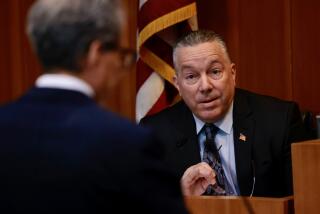Valenzuela, CHRB Are at ‘a Standstill’
- Share via
The jockey with the familiar “P Val” on the back of his helmet was in the saddle as horses galloped around the track during training hours Friday morning at Santa Anita.
But whether Patrick Valenzuela will be in the irons on opening day of the Oak Tree meet Wednesday depends on the outcome of the latest legal wrangling involving the California Horse Racing Board and the brilliant but often troubled jockey with a history of substance abuse.
“I’m here today working horses and I’m healthy. I’m ready to go,” said Valenzuela, who passed multiple drug tests before and after his six-week hospitalization at a facility that treats patients with mental health and addiction issues but has refused the CHRB’s requests for more medical reports, citing privacy issues.
Tom Knust, Valenzuela’s agent, has lined up seven mounts for opening day. But although Valenzuela is not technically suspended, the CHRB has not given him the OK to resume riding races in California after missing the Del Mar meet because of back trouble and the other health issues he has refused to disclose.
Valenzuela wouldn’t comment further as he mingled with trainers and the morning crowd at Clockers’ Corner between working horses, saying he didn’t want to affect the outcome of attorney Neil Papiano’s talks with the CHRB.
But the stalemate is coming to a head with entries and jockey assignments for opening day set to be taken Sunday.
“I’m still hopeful we’ll get it resolved,” Ingrid Fermin, executive director of the CHRB, said Friday. Papiano called the situation “a standstill.”
“He has a license. He’s passed every test,” Papiano said.
But he called Valenzuela’s other medical records “personal,” citing a right to privacy despite the fact Valenzuela signed a contract with the CHRB agreeing to submit to drug testing and provide other requested medical documentation as a condition of receiving a provisional license after previous suspensions.
“We said at the time that this is unconstitutional, but they said if you don’t sign it you will not be able to ride,” Papiano said.
“You can’t be forced to sign away your constitutional rights in order to earn a living,” he said, citing legal precedents he believes support Valenzuela’s case. “Whatever he was in there doing is very private. What if he went in there to try to stop [a potential relapse]? Does he get penalized for trying to help himself?”
Knust, who earlier alluded to the possibility of depression and family issues, said he did not believe Valenzuela had been using drugs.
“The thing is, Patrick is doing really well physically and mentally and wants to ride,” he said.
Valenzuela’s current issues with the CHRB intensified when investigators were unable to get samples for drug tests while he was hospitalized this summer. (In 2004, Valenzuela was unable to provide a hair sample after shaving much of his body.)
But the latest episode has not affected his ability to ride outside California. In his only mount since the Hollywood Park meet closed in July, Valenzuela won the $1 million Woodbine Mile in Canada on Sunday aboard Becrux.
Trainers remain eager to give him mounts, with Doug O’Neill and Mike Mitchell among those who have used him to work horses during morning training hours in the month since the CHRB gave its approval after he passed a urine test. He later passed a hair test that is said to detect drug use in the previous 90 days.
“I think from my point of view, horses just run for Patrick,” said O’Neill, who plans to name him on a horse for opening day.
CHRB Chairman Richard B. Shapiro has said the board is seeking to ensure the safety of not only Valenzuela, but other riders.
Some jockeys in the past opposed Valenzuela’s being licensed because of his drug use, among them Corey Nakatani.
“When you’ve had opportunities in front of you and have made poor decisions, I believe you deserve a second chance,” Nakatani said Friday. “But when you make an agreement or a contract that you’re supposed to disclose everything that happens and drug-test, I think you have to do that before you get your license back.”
Whatever the resolution, this is likely not the last conflict involving horse racing officials and Valenzuela, 43, who is not inclined to retire in his 40s as some other top jockeys have. “He wants to ride 10 more years,” Knust said.
More to Read
Go beyond the scoreboard
Get the latest on L.A.'s teams in the daily Sports Report newsletter.
You may occasionally receive promotional content from the Los Angeles Times.










